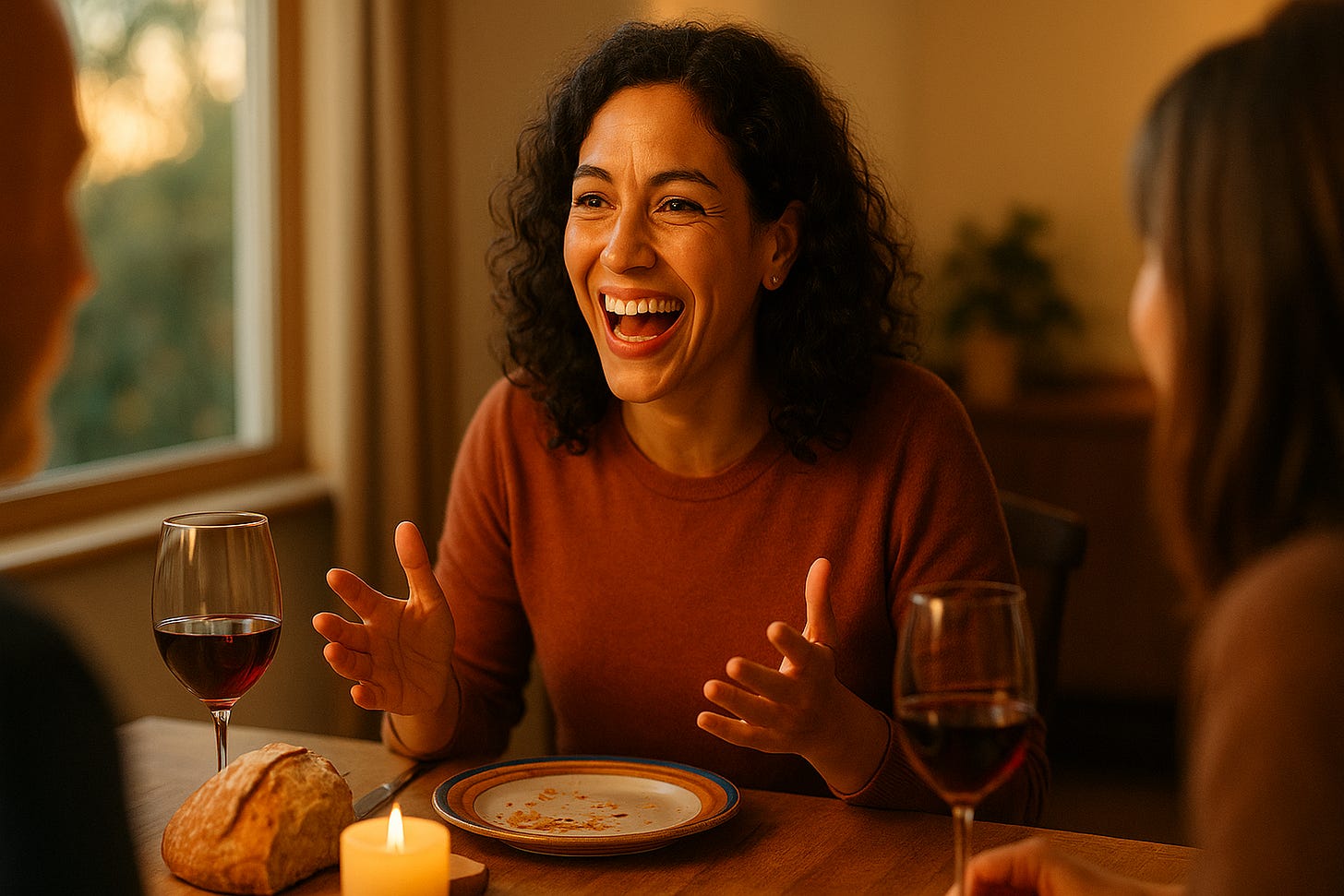If You Can Tell a Story at Dinner, You Can Create Content
Why storytelling is your secret weapon, especially in your second act.
Over dinner with friends last week, someone asked me to tell "that one story" again. The one about the time I went live for my cooking show and forgot to unmute my mic for a full five minutes.
We laughed. Someone jumped in with their own Zoom meeting disaster. Soon we were swapping stories, everyone chiming in: "Wait — remember when...?" "You have to tell them the rest.
We weren't performing. We weren't "on." We were sharing experiences, which is what creating content should feel like.
If you've ever told a story at dinner, made someone laugh, feel something, or lean in, you already have a powerful skill: you know how to tell a story.
You're Already Doing It
Think about the last time you shared a story that people connected with. Maybe it was about a travel mishap that turned into an adventure, or a career pivot that seemed terrifying but changed everything.
You didn't read from a script. You didn't have perfect lighting or a fancy setup. But you knew exactly how to:
Set the scene just enough to pull them in
Build tension with well-timed pauses
Share the vulnerable moment that made it real
Capture what made it worth telling
That's content creation. You've been doing it your whole life.
From the Dinner Table to the Digital Stage
Here's where people can get stuck: they think creating content is different from the storytelling they already do. But the mechanics are identical.
Take my unmuted mic story. At dinner, I started with the visual: "Picture me, chopping onions with complete confidence, explaining my technique..." I built suspense: "Five minutes in, I notice the chat going wild..." Then the reveal: "I'd been giving a silent cooking demonstration the entire time."
When I turned that same story into a reel, nothing changed except the format. Same setup, same pacing, same payoff. The only difference was that I had 60 seconds instead of five minutes, so I had to cut it down to the best parts.
The stories you tell at dinner? They could make great content, and you should share those stories beyond the dinner table.
You Already Have What You Need
If you're in your second act, you've lived a little, pivoted once or twice, and collected some battle scars and breakthrough moments. You don't just have stories. You have a curated collection spanning decades.
You've found your rhythm with these stories and how they affect people. You know which ones make them think, laugh, and which ones they ask to hear again. You've refined the timing, figured out which details to include and which ones to leave out.
The Format is Just the Frame
Whether you turn your story into a LinkedIn post, a TikTok video, or a newsletter, the story remains the same. You're just choosing different frames for the same powerful picture.
A dinner party story becomes:
A 90-second reel about the lesson learned
A LinkedIn post about the career insight
A newsletter about the turning point
A podcast episode about the whole journey
Same story, different formats. And because you've already told it successfully in person, you know it works.
Connecting Your Stories to Your Message
The best content creators don't just tell good stories — they tell stories that illuminate what they're teaching.
If you're sharing business insights, your story about the client meeting that went sideways becomes a valuable lesson about the importance of preparation and adaptability. If you're teaching about work-life balance, the story about missing your child's game because of an "urgent" project that turned out to be meaningless resonates differently.
That's when your personal experience can become someone else's roadmap.
Instead of asking, "What content should I create?" ask yourself, "Which of my stories could help someone else?"
Think about what you want to be known for, then explore your story collection:
Teaching productivity? Your stories about systems that failed, breakthroughs that changed everything, or the day you finally learned to say no become case studies in human behavior and boundaries.
Sharing parenting wisdom? That moment that helped you see your child differently, or that realization about letting go, these become guideposts for other parents navigating the same challenges.
Building a business? Your early mistakes, or that hobby that became a side business, become real-world MBA lessons that no textbook can teach.
Your stories give you credibility. They show that your insights come from lived experience, not theory.
Your Next Move
You don't need to learn how to be a storyteller. You already are one.
Start paying attention to which stories support what you want to teach, then give them the audience they deserve.
What's one lesson you've learned the hard way that could save someone else time, money, or heartache? That's a story. That's your content.
Want more tips and insights? Check out the Creative Amplifiers Show, where we share practical advice and plenty of stories from the trenches of content creation and live streaming.
If this sparked something, leave a comment and share the story you're ready to tell beyond the dinner table.




